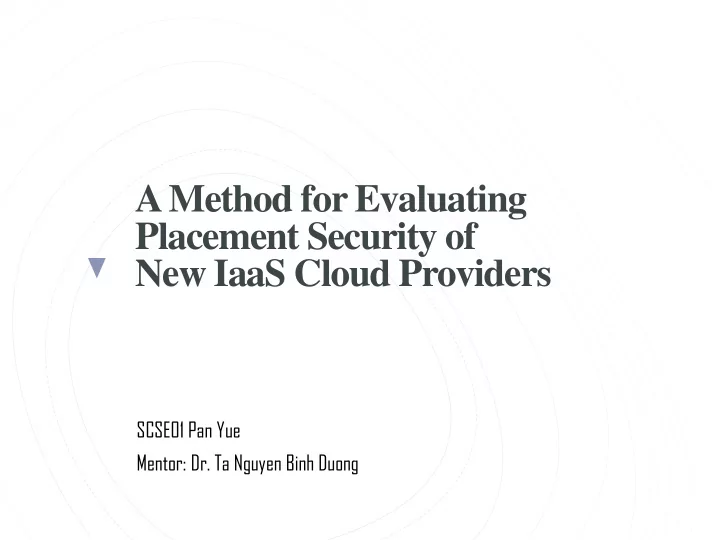

A Method for Evaluating Placement Security of New IaaS Cloud Providers SCSE01 Pan Yue Mentor: Dr. Ta Nguyen Binh Duong
Overview Introduction to Problem Background research Experimental methodology Results and analysis Future development
Introduction to Problem
IaaS clouds -a popular model of cloud computing • Configurable computing resources shared over the internet • Hosts Virtual Machines (VM) on shared physical infrastructure (Multi-tenancy)
Co-location Attacks - a security risk in IaaS Clouds data • Launched on victim VMs on the same physical host as attacker • Extract confidential data or degrade performance of victim
Aims of research I. Examine an evaluation technique of IaaS cloud placement security (memory-bus locking) II. Explore how the findings can be applied to evaluate commercial IaaS cloud providers
Background Research
Co-location Attack Mechanism Victim VM Attacker VM Co-location Detection Request VM Attacker
Co-location Detection • Covert side channel detection create contention in shared hardware resources of host cause observable performance degradation in victim Attacker Victim Intensive Normal Request request request delayed Shared hardware resource
Co-location Detection • Memory bus locking create contention in memory bus of host observe degraded performance in accessing main memory Attacker Victim Continuous Access access to memory delayed main memory bus
Evaluating Placement Security Susceptibility to co-location attacks indicates Susceptibility to co-location detection MAY test for memory bus locking
Hypothesis Memory bus locking can achieve accurate co-location detection in both cooperative and uncooperative cases, and hence prove useful for evaluating placement security of IaaS cloud providers.
Experimental Methodology
Cooperative memory-bus locking • Lock and Probe model • two VMs set up on same local host • one locks memory-bus (attacker), one performs and measures affected task(victim)
Cooperative experiment set-up memory shared bus hardware
Locking: Implementation reference: github.com/jacnel/co-res
Probing: Implementation reference: Varadarajan et al., 2017
Uncooperative memory-bus locking • Lock and Probe model, revised • Attacker and victim VMs set up retained • Does not assume control over victim (cannot measure own performance) • A third VM (evaluator) on unknown host to measure victim’s performance
Uncooperative experiment set-up • Victim: web server • Virtual host with public domain OR local host domain • Apache 2 • Evaluator • Accesses victim’s domain • Measures server performance • Apache Jmeter
Experiment summary Attacker locks memory bus by executing Locking code cooperative uncooperative Victim performs task and Victim performs task and Evaluator measures own performance measures performance Observe performance degradation in victim to detect co-location
Results and Analysis
Cooperative experiment results Data collected as the number of CPU clock cycles required to execute one run of the probe program, taken for 100 runs
Cooperative experiment results The average runtime with locking instance sees a 70% increase compared to without locking. Performance degradation is apparent Co-location successfully detected
Conclusion for cooperative detection • Memory-bus locking can accurately detect co-location in the cooperative case • Hence, it can evaluate the placement security of IaaS clouds if a dedicated server can be purchased to ensure the co-location of lock and probe VMs
Overall Conclusion Memory bus locking is an effective co-location detection technique in the cooperative case, which can be used for evaluating placement security in cloud providers under controlled conditions.
Future Developments
Future developments • Complete experiments for the uncooperative case • Apply memory-bus locking detection technique to commercial cloud providers
Thank You
Main References Varadarajan, V. (2015). A Placement Vulnerability Study in Multi-Tenant Public Clouds. USENIX. Delimitrou, C., & Kozyrakis, C. (2017). Bolt: I Know What You Did Last Summer...In the Cloud. ACM SIGOPS Operating Systems Review,51(2), 599-613. doi:10.1145/3093315.3037703 Han, Y., Chan, J., Alpcan, T., & Leckie, C. (2015). Using Virtual Machine Allocation Policies to Defend against Co-resident Attacks in Cloud Computing. IEEE Transactions on Dependable and Secure Computing,1-1. doi:10.1109/tdsc.2015.2429132 Nelson, J. (2017). Co-residency Detection and Memory Bus Locking. Ristenpart, T. (n.d.). Hey, You, Get Off of My Cloud: Exploring Information ... Retrieved from https://hovav.net/ucsd/dist/cloudsec.pdf Alibaba Cloud Ranks the World's Third Largest Cloud Services Provider for Two Consecutive Years. (n.d.). Retrieved from https://www.alibabacloud.com/press-room/alibaba-cloud-ranks- the-worlds-third-largest-cloud-services-provider-for-two-consecutive- time?spm=a2c5t.10695662.1996646101.searchclickresult.4a645316ZjqxGh
Recommend
More recommend